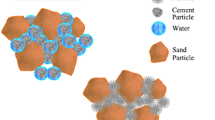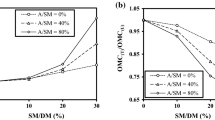Abstract
Bio-cementation soil treatment technique has shown significant strength improvement in sandy soils rather than clayey soils. In the present study, an attempt was made to examine the unconfined compressive strength (UCS) and Young’s modulus of clayey soil via an environmental friendly bio-cementation process by adding eggshell as a calcium source. Several UCS tests were conducted on two types of clayey soils with varying plasticity with two different bacteria to evaluate the strength parameters under laboratory conditions. The other laboratory tests including calcium carbonate content test and microstructural studies were carried out on treated and untreated clayey soils. Experimental variables fixed in this study were bacteria type, soil type and type and concentration of cementing agents. The experimental test data concluded that the maximum value of unconfined compressive strength, Young’s modulus and calcium carbonate content attained in this study was 0.5 MPa, 15.19 MPa and 9.59%. These maximum values have been attained for CL soil stabilized with Sporosarcina pasteurii bacteria and 0.50 M concentration of eggshell cementing agents. A higher UCS enhancement was observed in CL soil than CI soil, and the improvement was 250.75% higher than untreated CL soil. Sporosarcina pasteurii bacteria stabilized CL and CI soils possess more strength than Lysinibacillus fusiformis bacteria due to higher urease activity (450 U/ml). Further, the SEM images and EDS micrographs pointed out the formation of calcite crystals in the bio-cemented clay soils. Based on the experimental findings, it can be concluded that eggshells can be used for the clay bio-cementation process.




















Similar content being viewed by others
References
Arpajirakul S, Pungrasmi W, Likitlersuang S (2021) Efficiency of microbially-induced calcite precipitation in natural clays for ground improvement Constr Build Mater 282 122722https://doi.org/10.1016/j.conbuildmat.2021.122722
Behzadipour H, Pakbaz MS, Ghezelbash GR (2019) Effects of biocementation on strength parameters of silty and clayey sands Bioinspired, Biomimetic Nanobiomaterials 9 24 32 https://doi.org/10.1680/jbibn.19.00002
Canakci H, Sidik W, Kilic IC (2015) Bacterial calcium carbonate precipitation in peat Arab J Sci Eng 40 2251 2260 https://doi.org/10.1007/s13369-015-1760-4
Carmona JP, Oliveira PJV, Lemos LJ (2016) Biostabilization of a sandy soil using enzymatic calcium carbonate precipitation Proc Eng 143 1301 1308 https://doi.org/10.1016/j.proeng.2016.06.144
Casey B, Germaine J, Abdulhadi N, Kontopoulos N, Jones C (2016) Undrained Young’s modulus of fine-grained soils J Geotechn Geoenviron Eng 142 04015070 https://doi.org/10.1061/(ASCE)GT.1943-5606.0001382
Choi S-G, Wu S, Chu J (2016) Biocementation for sand using an eggshell as calcium source J Geotechn Geoenviron Eng 142 06016010 https://doi.org/10.1061/(ASCE)GT.1943-5606.0001534
Choobbasti AJ, Samakoosh MA, Kutanaei SS (2019) Mechanical properties soil stabilized with nano calcium carbonate and reinforced with carpet waste fibers Constr Build Mater 211 1094 1104 https://doi.org/10.1016/j.conbuildmat.2019.03.306
Chu J, Ivanov V, He J, Naeimi M, Li B, Stabnikov V (2011) Development of microbial geotechnology in Singapore. Geo-Frontiers 2011: Advances in Geotechnical Engineering. pp 4070–4078 https://doi.org/10.1061/41165(397)416
Duo L, Kan-liang T, Hui-li Z, Yu-yao W, Kang-yi N, Shi-can Z (2018) Experimental investigation of solidifying desert aeolian sand using microbially induced calcite precipitation Constr Build Mater 172 251 262
Gao Y, He J, Tang X, Chu J (2019) Calcium carbonate precipitation catalyzed by soybean urease as an improvement method for fine-grained soil Soils Found 59 1631 1637 https://doi.org/10.1016/j.conbuildmat.2018.03.255
Gowthaman S, Nakashima K, Kawasaki S (2021) Effect of wetting and drying cycles on the durability of bio-cemented soil of expressway slope. International Journal of Environmental Science and Technology:1–14. https://doi.org/10.1016/j.sandf.2019.03.014
Ivanov V, Chu J (2008) Applications of microorganisms to geotechnical engineering for bioclogging and biocementation of soil in situ Rev Environ Sci Bio/technol 7 139 153 https://doi.org/10.1007/s11157-007-9126-3
Kalantary F, Kahani M (2019) Optimization of the biological soil improvement procedure Int J Environ Sci Technol 16 4231 4240 https://doi.org/10.1007/s13762-018-1821-9
Kim D, Park K (2013) An environmentally friendly soil improvement technology with microorganism Int J Railway 6 90 94 https://doi.org/10.7782/IJR.2013.6.3.090
Kulanthaivel P, Soundara B, Das A (2020) Performance study on stabilization of fine grained clay soils using calcium source producing microbes KSCE J Civ Eng 24 2631 2642 https://doi.org/10.1007/s12205-020-2028-4
Kulanthaivel P, Selvakumar S, Soundara B, Kayalvizhi V, Bhuvaneshwari S (2022a) Combined effect of nano-silica and randomly distributed fibers on the strength behavior of clay soil Nanotechnol Environ Eng 7 1 12 https://doi.org/10.1007/s41204-021-00176-3
Kulanthaivel P, Soundara B, Selvakumar S (2022b) Application of waste eggshell as a source of calcium in bacterial bio-cementation to enhance the engineering characteristics of sand Environ Sci Pollut Res https://doi.org/10.1007/s11356-022-20484-8
Lin H, Suleiman MT, Brown DG, Kavazanjian E Jr (2016) Mechanical behavior of sands treated by microbially induced carbonate precipitation J Geotech Geoenviron Eng 142 04015066 https://doi.org/10.1061/(ASCE)GT.1943-5606.0001383
Lv C, Zhu C, Tang C-S, Cheng Q, Yin L-Y, Shi B (2021) Effect of fiber reinforcement on the mechanical behavior of bio-cemented sand Geosynth Int 28 195 205 https://doi.org/10.1680/jgein.20.00037
Muhammed A, Kassim K, Ahmad K, Zango M, Chong C, Makinda J (2021) Influence of multiple treatment cycles on the strength and microstructure of biocemented sandy soil. International Journal of Environmental Science and Technology:1–14. https://doi.org/10.1007/s13762-020-03073-5
Mujah D, Cheng L, Shahin MA (2019) Microstructural and geomechanical study on biocemented sand for optimization of MICP process J Mater Civ Eng 31 04019025 https://doi.org/10.1061/(ASCE)MT.1943-5533.0002660
Selvakumar S, Kulanthaivel P, Soundara B (2021b) Influence of nano-silica and sodium silicate on the strength characteristics of clay soil Nanotechnol Environ Eng 6(1):10 https://doi.org/10.1007/s41204-021-00142-z
Selvakumar S, Soundara B, Kulanthaivel P (2022) Model tests on swelling behavior of an expansive soil with recycled geofoam granules column inclusion Arab J Geosci 15 187 https://doi.org/10.1007/s12517-022-09427-2
Selvakumar S, Kulanthaivel P, Soundara B (2021a) Experimental Investigation of Geosynthetic Encased Conventional Aggregate and Fly Ash Brick Bats Columns on Soft Clay. International Journal of Pavement Research and Technology:1–19. https://doi.org/10.1007/s42947-021-00118-x
Sharma A, Ramkrishnan R (2016) Study on effect of microbial induced calcite precipitates on strength of fine grained soils Perspectives Sci 8 198 202 https://doi.org/10.1016/j.pisc.2016.03.017
Sharma M, Satyam N, Reddy KR (2021) Investigation of various gram-positive bacteria for MICP in Narmada Sand, India Int J Geotech Eng 15 220 234 https://doi.org/10.1080/19386362.2019.1691322
Sidik WS, Canakci H, Kilic IH, Celik F (2014) Applicability of biocementation for organic soil and its effect on permeability. Geomechanics and Engineering 7:649–663. https://doi.org/10.12989/gae.2014.7.6.649
Soundara B, Selvakumar S (2019) Swelling behaviour of expansive soils randomly mixed with recycled geobeads inclusion. SN Appl Sci 1(10) https://doi.org/10.12989/gae.2014.7.6.649
Soon NW, Lee LM, Khun TC, Ling HS (2013) Improvements in engineering properties of soils through microbial-induced calcite precipitation KSCE J Civ Eng 17 718 728 https://doi.org/10.1007/s12205-013-0149-8
Stróżyk J, Tankiewicz M (2016) The elastic undrained modulus Eu50 for stiff consolidated clays related to the concept of stress history and normalized soil properties. Studia Geotechnica et Mechanica 38. https://doi.org/10.1515/sgem-2016-0025
Sun X, Miao L, Chen R (2019) Effects of different clay’s percentages on improvement of sand-clay mixtures with microbially induced calcite precipitation Geomicrobiol J 36 810 818 https://doi.org/10.1080/01490451.2019.1631912
Yang B, Li H, Li H, Ge N, Ma G, Zhang H, Zhang X, Zhuang L (2020) Experimental investigation on the mechanical and hydraulic properties of urease stabilized fine sand for fully permeable pavement Int J Trans Sci Technol https://doi.org/10.1016/j.ijtst.2020.12.002
Yasir S, Abbas H, Jani J (2018) Estimation of soil young modulus based on the electrical resistivity imaging (ERI) by using regression equation. AIP Conference Proceedings. AIP Publishing LLC. p 020071. https://doi.org/10.1063/1.5062697
Yasuhara H, Neupane D, Hayashi K, Okamura M (2012) Experiments and predictions of physical properties of sand cemented by enzymatically-induced carbonate precipitation Soils Found 52 539 549 https://doi.org/10.1016/j.sandf.2012.05.011
Yuan H, Liu K, Zhang C, Zhao Z (2021) Mechanical properties of Na-montmorillonite-modified EICP-treated silty sand. Environmental Science and Pollution Research:1–13. https://doi.org/10.1007/s11356-021-16442-5.
Funding
The authors collected no financial support from any government/private agencies.
Author information
Authors and Affiliations
Contributions
PK conceptualized the presented idea, derived the methodology, designed and performed the experiments and writing original draft. BS developed the theory, supervised the findings, supported in writing review and editing. SS article drafting and contributed to the final version of the manuscript. AD contributed to final version and supported in writing review and editing the manuscript.
Corresponding author
Ethics declarations
Conflict of interest
The authors declare that they have no known competing financial interests or personal relationships that could have appeared to influence the work reported in this paper.
Additional information
Publisher's Note
Springer Nature remains neutral with regard to jurisdictional claims in published maps and institutional affiliations.
Rights and permissions
About this article
Cite this article
Kulanthaivel, P., Soundara, B., Selvakumar, S. et al. Effect of bio-cementation on the strength behaviour of clay soils using egg shell as calcium source. Environ Earth Sci 81, 348 (2022). https://doi.org/10.1007/s12665-022-10475-w
Received:
Accepted:
Published:
DOI: https://doi.org/10.1007/s12665-022-10475-w




